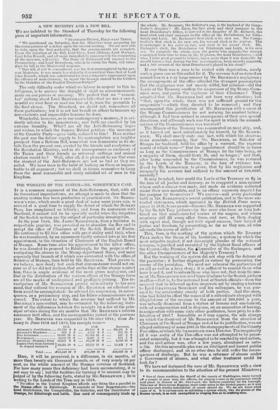A NEW MINISTRY AND A NEW BILL.
WE are indebted to the Standard of Thursday for the following piece of important information.
" STANDARD OFFICE, HALF-FAST THREE.
" We mentioned on Saturday, that the Ministers were preparing for the consequences of a defeat upon the second reading. We are now able to state, upon the best authority, that the arrangements are complete. Upon the rejection of the Bill, Lord Grey, Lord Althorp, Lord Durham, Lord John Russell, and all more immediately concerned in the concocting of the measure, will retire. The Duke of Richmond will succeed to the Premiership; and Lord Brougham, who is to retain the Seals, will intro- duce his bill as the Ministerial measure.
" This bill, it will be remembered, was the first contemplated by the pre. sent Ministers. It was much less violently democratical than that of Lord John Russell ; which was substituted for it as a desperate experiment upon the efficacy of mob clamour, to repair the damage caused to the Cabinet by the blunders of the Poulett Thomson Budget."
The only difficulty under which we labour in respect to this in- telligence, is to answer the draught at sight so unceremoniously made on our powers of memory. We protest that we " remem- ber" nothing about Lord BROUGHAM'S bill—that we never saw it, nor did we ever hear or read one line of it, from the preamble to the final clause. The Standard, we doubt not, remembers all these particulars; but it is not fair to call on others to treasure up non-existents and impossibles because he does. Wonderful, however, as is our contemporary's memory, it is evi- dently inferior. to his imagination ; and both are excelled by his extreme humility. What ! are all the Anti-Reforming hopes and wishes, to which the famous Bristol petition—the movement of the Country Party—gave birth, reduced to this ? Does neither the past nor the future supply to his contemplation any brighter prospect than a Reform Bill, somewhat less democratic in its de- tails than the present one, carried by the friends and coadjutors of the Revolution Ministry, and in its consequences as exelusory of the Tories and their friends as universal suffrage and annual election would be ? Well, after all, it is pleasant to see that even the stoutest of the Anti-Relbrmers are not so bad as they are called. We have been in the habit of looking on them as impene- trable to all argument ; but we shall in future remember to fancy them the most reasonable and easily satisfied set of men in the kingdom.


























 Previous page
Previous page